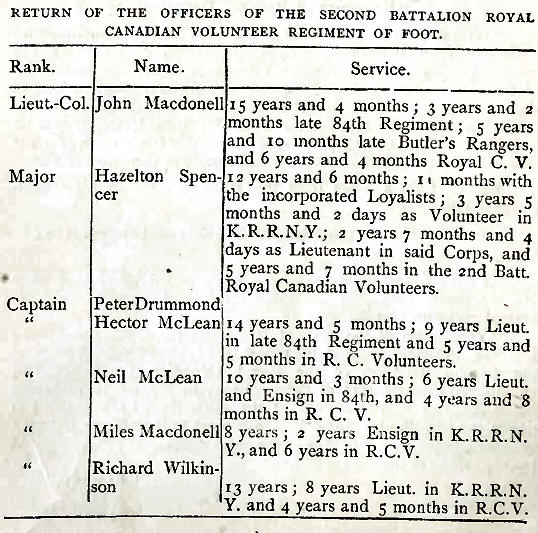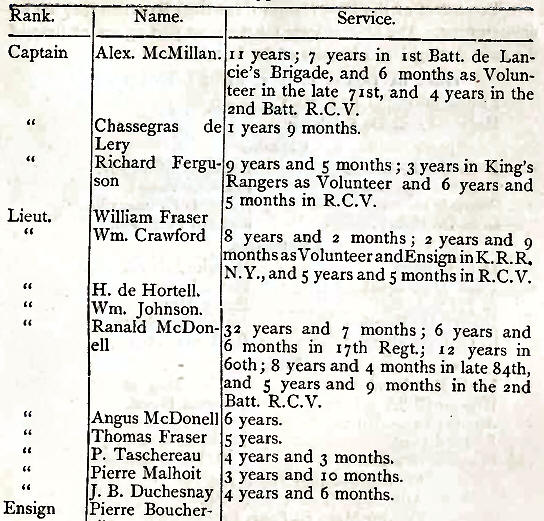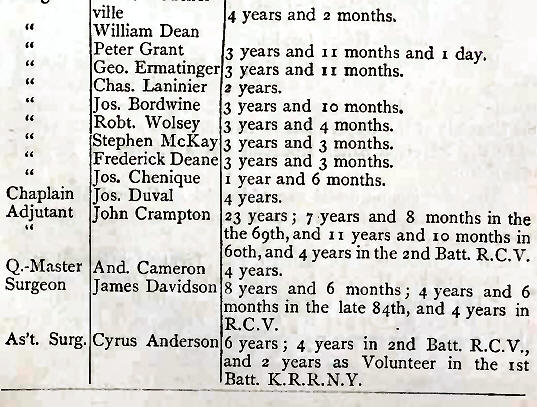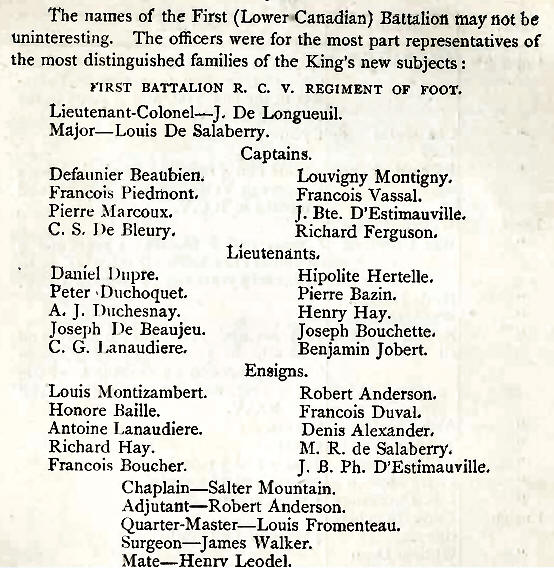|
The First Regiment Raised in
Upper Canada.—The Second Battalion R. C. V. Regiment of
Foot.—Lieutenant-Colonel Macdonell, M.P. for Glengarry, Placed in Command.—
Headquarters at Fort George - Volunteer their Services to any Quarter of the
Globe - Thanks of Duke of Kent.—Reduction of Regiment during Peace of
Amiens.—Return of Officers.—List of Officers First or Lower Canadian
Battalion—Colonel Macdonell's Memorial.— State of the Militia.— Lieutenants
of Counties.—Colonel Macdonell Recommends Formation of a Corps of Highland
Fencibles in Glengarry - Colonel Brock Approves of Proposal and Transmits
Recommendation to War Office—Death of Colonel Macdonell.
In 1794 a number of
Independent Companies were in existence m Upper Canada, which in 1796 were,
with others in Lower Canada, embodied in a Regiment of two Battalions, the
second Battalion being under the command of Lieutenant-Colonel John
Macdonell, the member for Glengarry. This Regiment was placed on the
Permanent Establishment, and was known as the Royal Canadian Volunteer
Regiment of Foot. The Second Battalion was the first Corps raised in Upper
Canada. The First Battalion was commanded by Lieutenant-Colonel Da Longueuil,
with Louis DeSala berry as Major. The Second Battalion garrisoned this
Province from 1796 until disbanded in 1832, as did the First Battalion the
Province of Lower Canada during the same period.
Colonel Macdonell's
headquarters were at Fort George (Niagara) during the peril id the Regiment
was on service. Detachments were stationed at the following places, viz:
Kingston, under Major Spencer; St. Joseph's Island, under Captain Drummond;
Amherstburg, under Captain Hector McLean; Fort Erie, under Captain
Wilkinson; Fort Chippewa, under Lieutenant William Crawford.
In 1800 a suggestion appears
to have been made that it would be of advantage if the Second Battalion, R.
C. V., would extend its service to any part of British America, and Colonel
Macdonell having submitted the matter to the officers under his command, was
enabled to address the following letter to the Officer commanding in Canada:
"Fort George, February 20,
1800.
"Sir,
"I have the honour to
acknowledge the receipt of your letter of the 26th November, with
enclosures.
"The suggestion that the
services of the Second Battalion Royal Canadian Volunteers might be usefully
extended to the different parts of British North America in general was no
sooner made known to the five companies forming the garrison in this post,
Fort Erie, and Fort Chippewa than they were most cheerfully offered, and
generally showed a desire to extend them to any part of His Majesty's
dominions.
"The officers (as might be
expected from such Loyalists) expressed satisfaction at having an
opportunity of testifying their zeal and attachment to their King by
tendering their services in any part of the globe to which they might have
the honour of being called. I shall have the honour of reporting to you as
soon as possible the sentiments of the other four companies at Kingston,
Amhersthurg, and St. Joseph. I think, however, I can vouch that their zeal
to His Majesty's service is not less than the companies I have already
mentioned. The example of the Nova Scotia and New Brunswick Corps is
certainly highly meritorious, and would no doubt operate strongly in
exciting an emulation in others; but I have the vanity to believe that the
Second Battalion of Royal Canadian Volunteers would have offered their
services even had the other Provincial Corps not shown the example.
"I have the honour to be,
Sir,
"Your most obedient servant,
" J. Macdonell.
"To Lieutenant-General
Hunter,
"Commanding His Majesty's
Forces in both Canadas."
The offer of service which
Colonel Macdonell was thus authorized to make or behalf of his Battalion was
acknowledged by H R H. the Duke of Kent in the following letters:
Extract from letter of the
Duke of Kent to Lieutenant-General Hunter, commanding the Forces in the
Canadas, through his Aide-de-Camp, Major Gordon :—
"Kensington Palace, December
15, 1800.
"With respect to your letter
of the 26th of July, containing an enclosure from Lieutenant-Colonel
Macdonell, commanding the Second Battalion Royal Canadian Volunteers, of the
four companies of that Corps stationed at Kingston and Amherstburg, to
extend their services as Fencibles throughout British America. I am
commanded to desire that the thanks of His Royal Highness may be
communicated to those four companies for this fresh mark of their zeal for
the service and attachment and loyalty to their Sovereign."
Extract from a letter from
the Duke of Kent to Lieutenant-General Hunter :—
"Pavillion, Brightelmstone,
October 25th, 1800.
"Sir,
"I have the pleasure to
acknowledge the receipt of your letter No. 12, dated York. July 25, which
reached me together with its several enclosures on the 25th ult.
"Your !etter of the 26th of
July to Major Gorden enclosing Lieutenant-Colonel Macdouell's report that
four more companies of the Second Battalion of the Royal Canadian Volunteers
had volunteered the extension of their services to the whole of British
North America having arrived at the same time, I am enabled to desire you to
authorize that officer to express to the officers and men of those companies
my thanks in the same manner as he was desired to do to those of the former
five.
"Edward."
Colonel Macdonell was obliged
to adhere steadily to his post from the first raising of the Regiment, as
appears from a letter addressed by him to the Military Secretary at Quebec
dated September 1, 1800 :
"Not having it in my power to
examine into the state of the Militia of the County of Glengarry, nor of my
private affairs since the first raising of the Royal Canadian Volunteers, I
take the liberty to request of Lieutenant-General Hunter leave of absence
tor a few weeks for those purposes.
"Captain McMillan has
requested me to apply for leave of absence for him on private affairs in
Glengarry, he "not having been absent since he first joined."
This Regiment was, together
with many others, and including all the Fencible Regiments in the service,
disbanded during the Peace of Amiens in 1802.
The following is the return
on the reduction showing the names of the officers of this Battalion, with
their respective length and record of service :—
The names of the P'iist
(Lower Canadian; Battalion may not be uninteresting. The officers were for
the most part representatives of the most distinguished families of the
King's new subjects :




Hugh Macdonell, M.P. for
Glengarry, and subsequently Consul Genera! at Algiers, was at one tune
Senior Captain in the First Battalion R. C. V. It is worthy of note that,
judging from the names, the Chaplain of the Upper Canada Battalion was a
Catholic priest, while, the Reverend Salter Mountain was a Church of England
clergyman.
The folk wing memorial was
addressed by Colonel Macdonell to the Commander of the Forces in Canada on
the reduction of the Regiment:
To His Excellency Peter
Hunter, Esq., Lieutenant General commanding His Majesty's Forces in Upper
and Lower Canada.
"The memorial of the Field
Officers, Captains and Subalterns of the St cord Battalion of His Majesty's
Regiment of Royal Canadian Volunteers most respectfully sheweth;
4i That whilst your
memorialists view with unfeigned satisfaction the general happiness afforded
by the restoration of peace, they cannot on that occasion reflect without
emotion upon the particular circumstances of their own situation.
"That a very considerable
proportion of your memorialists had the honour to serve His Majesty during
the American War. and having at the conclusion of it settled upon and
cultivated the lands assigned to then, were beginning to reap some of the
fruits of their exertions, and with the assistance of their half-pay to
enjoy some degree of ease and comfort when the War broke out; and that the
rest of your memorialists are sons to persons of the very same description.
"That as the appearances of
things at that time indicated but a short period of service, your
memorialists eagerly embraced the opportunity of evincing their grateful
attachment to their Sovereign Without contemplating any other reward than
the appointments 'of their respective rank, and with no prospects but of
soon returning to that life of industry on which their principal dependence
was necessary placed—both for present support and for the means of future
provision for their families.
That the destructive ambition
of His Majesty's enemies having, contrary to all expectations, protracted
the War to such a length, your memorialists have now remained embodied
nearly eight years; the consequence has been that the domestic affairs of
your memorialists of the first description have in that long interval of
absence and unavoidable neglect been materially impaired, and they will now
be obliged (unless His Majesty's gracious favour be extended to them; to
return to their homes at a more advanced period in life and with prospects
less favourable both for themselves and their families than when the War
began. Your memorialists of the latter description are involved in a still
more gloomy situation, for having dedicated many of their years to a
military life, and having passed in His Majesty's service that period of
their lives during which they might have embraced other professions, unless
some provision be made for them by the munificence of their Sovereign,
having no resources of their own, it is painful to foresee the hardships and
difficulties which must await them.
"Your memorialists therefore
most humbly pray of Your Excellency that you will lay them at His Majesty's
feet, beseeching him that he will be graciously pleased to place them upon
the half pay list according to the rank which they at present hold in his
service.
"And that His Majesty will
also be graciously pleased to extend to the Battalion the same gracious
bounty in donation of waste of the Crown which was extended to the
Provincial Corps at the end of the American War—a measure which, brides
filling the hearts of your memorialists with additional gratitude, would at
the same time place at the disposal and within the immediate call of His
Majesty's representatives in this Province a body of loyal disciplined men,
attached to the country, and proud of transmitting their own principles and
sentiments unimpaired to their posterity, and your memorialists as m duty
bound will ever pray.
"J. Macdonell,
"Lieutenant-Colonel,'
"Commanding Second Battalion Royal Canadian Volunteers,
For himself and on behalf of the officers and men of the Corps.
" Fort George, 24 August, 1802."
It is evident from the
statement in the memorial of Mrs. Hugh Macdonell, quoted hereafter, that the
prayer of the officers to be placed on half-pay according to their
respective rank was not acceded to, but from information gathered in the
Crown Lands Office I am led to believe that the men received an allotment of
land similar to that granted to the soldiers of the various Loyalist
Regiments of the Revolutionary War.
In addition to being a member
for the County of Glengarry, Colonel Macdonell occupied a position which
existed certainly between the years 1793 and 1808, though I can find no
lists of a later date than the latter year, viz., Lieutenant of the County
of Glengarry. The Duke de la Rochefoucault Liancourt who visited General
Simcoe at York, in his "Travels through the United States, the Country of
the Iroquois and Upper Canada," gives a succinct account of the duties of
lieutenants of Counties and of the militia organization of the Province. He
states that the division of the then four existing districts of the Province
into counties :
"Is purely military, and
relates merely to the enlisting, completing and assembling of the militia.
The Counties are about twelve in number" The militia of each county are
assembled and commanded by a lieutenant: They must be divided into regiments
and companies. They assemble once a year in each county, and are inspected
by the captains of the different companies at least twice a year. Every male
inhabitant is considered a militia man from the age of sixteen to fifty. He
is fined $4 if he does not enlist at the proper time; and officers, both
commissioned and non-commissioned, who do not join their regiments at the
time the militia is assembled pay a fine, the former of $8 and the latter of
$2. An officer who, in case of insurrection or an attack, should riot repair
to his assigned post, would be punished in a pecuniary penalty of £50, and a
petty officer with a fine of £20. A militia man who sells either the whole
or a part of his arms, ammunition or accoutrements is fined £5, an 1 in
default of payment imprisoned for two months. The Quakers, Baptists and
Tunkers pay, in times of peace, twenty shillings a year, and during a war or
insurrection five pounds sterling for their exemption from military service.
Out of these fines and ransoms, the Adjutant-General of the Militia receives
his pay and the remainder is at the Governor's disposal. This is nearly the
substance of the first Act of the Legislative body of Upper Canada, passed
in 1793."
The following year a further
Act was passed relating to the militia, tending to improve and more
accurately define the internal form of the Regiments, Battalions and
Companies, and to render the assembling of detachments more easy and
expeditious. It extended, in time of War, the obligation to bear arms to
sixty years, and directed that Quakers and others who were exempt should pay
for their immunity up to that age. It obliged the militia to serve on board
of ships and vessels, to act as cavalry and to extend their service beyond
the Province, on condition, however, that the same men should not be bound
to serve more than six months successively. The exemptions from service were
confined to the officers of justice and other public functionaries, whose
number was very small. The whole militia force was estimated at 9,000 men,
and the cost of maintenance was defrayed by the British Government. The
expense of civil and military administration, including money and presents
to the Indians, was then, for Upper Canada, about £100,000 per annum.
Dr. Canniff states, in his
"Settlement of Upper Canada," that "in all the measures I introduced by
Governor Simcoe and passed into law by Parliament can be discovered a
military mind actively at work. The arrangements by which he endeavoured to
settle the country, to secure it against invasion, to keep alive a spirit of
military ardour, to keep aglow the flame of patriotism, a love for the
Mother Country, were eminently judicious and commendable. There is no doubt
that the military spirit of Simcoe was pleasing to the old soldier-farmers,
and in them he found willing and zealous abettors of his military schemes."
I have lists of Lieutenants
of Counties of the years 1803 and 1808. I give that for the year 1803, which
is the earliest I am able to find. It is taken from the Upper Canada Almanac
of that year, published at York by John Bennet at his printing office, King
street:
Glengarry—Lieutenant-Colonel
John Macdonell.
Prescott—William Fortune, Esq.
Stormont—Archibald Macdonell, Esq.
Dundas—The Honourable Richard Duncan, Esq.
Grenville—Peter Drummond, Esq.
Leeds—James Brakenridge, Esq.
Frontenac—The Hon. Richard Cartwright.
Lennox—Hazelton Spencer, Esq.
Addington—'William Johnson, Esq.
Hastings—John Ferguson, Esq.
Prince Edward—Archibald Macdonell, Esq., of Marysburg.
Northumberland—Alexander Chisholm, Esq.
Durham—Robert Baldwin, Esq.
York—The Honourable D. W. Smith, Esq.
Lincoln—The Hon. Robert Hamilton, Esq.
Norfolk—Samuel Ryerse, Esq
Oxford—William Claus, Esq.
Essex—The Honourable Alexander Grant, Esq.
Kent—The Honourable James Baby, Esq.
It will be observed that
several of these gentlemen had previously held commissions in Colonel
Macdonell's Regiment. All of them were at the time in command of the militia
regiments of their respective counties, except in the case of the Counties
of Dundas, Grenville, Leeds and Essex, where the militia regiments were
commanded by Lieutenant-Colonel Allan Macdonell, Colonel William Fraser,
Colonel Joel Stone and Lieutenant-Colonel John Asken, respectively.
In 1807 Colonel Macdonell
proposed the formation of a Corps of Glengarry Fencibles, and the following
correspondence took place between himself and Colonel (afterwards
Major-General Sir Isaac) Brock and the War Office :
"Glengarry, January 28, 1807.
"Sir,
"I have the honour to enclose
you the proposals for raising a corps of Highland Fencibles in this County,
which were submitted to your perusal. The alterations you made are adopted
with very few exceptions: should they meet with your approbation, you will
be pleased to forward them to the War Office.
"The permanent pay asked for
the Field Officers and Chaplain may be considered unusual, but in this
instance it is necessary and expedient for carrying the proposals into
effect. The Field Officers must undergo a vast deal of trouble, and their
time will be as much occupied as if the Corps were constantly embodied.
"The County is almost
entirely inhabited by Highlanders and their descendants, naturally brave and
loyal as subjects, and firmly attached to the British Constitution and
Government, yet from their situation and circumstances, being in general
possessed of some landed property and the high ran of wages in the County,
they are reluctant to quit these advantages to become soldiers. Nothing but
a scheme of this nature, headed by gentlemen whom they know and respect,
would induce them on any consideration to put themselves under the
restraints of military discipline. The Chaplain having served in that
capacity in the late Glengarry Fencibles in Great Britain, Ireland and
Guernsey, has a claim to the favour of Government. He conducted a number of
these people to this country, and having rendered himself useful in many
respects to the people at large, has gained so far their confidence that his
services in urging and forwarding this matter will be very essential. The
adoption and successful issue of the present plan will greatly facilitate
any future project of raising troops for a more general and extended nature
of service.
I have the honour to be, sir,
"Your most obedient, humble
servant.
"J. Macdonell, " Lieutenant
of the County of Glengarry.
"Colonel Brock, &c."
Colonel Brock forwarded
Colonel Macdonell's proposal to the War Office with the following letter to
the Right Honourable Wiliiam Windham, then Secretary for War :—
"Quebec, February 12, 1807.
"I have the honour to
transmit for your consideration a proposal torn Lieutenant-Colonel John
Macdonell, late of the Royal Canadian Volunteers, for raising a Corps among
the Scotch settlers in the County of Glengarry, Upper Canada.
"When it is considered that
both the Canadas furnish only two hundred militia who are trained to arms,
the advantages to be derived from such an establishment must appear very
evident.
"The militia force in this
Country is very small, and were it possible to collect in time to oppose any
serious attempt upon Quebec, the only tenable post, the number would of
itself be insufficient to ensure a vigorous defence."
"This Corps, being stationed
on the confines of the Lower Province, would be always immediately and
essentially useful in checking any seditious disposition, which the wavering
sentiments of a large population in the Montreal District might at any time
manifest. In the event of invasion or other emergency, this force could be
easily and expeditiously transported by water to Quebec.
"The extent of Country which
these settlers occupy would make the permanent establishment of the staff
and one surgeon in each company very advisable. I shall not presume to say
how far the claims of the field Officers to the same indulgence are
reasonable and expedient.
"In regard to the Rev.
Alexander Macdonell, I beg leave to observe that the men, being all
Catholics, it may be deemed a prudent measure to appoint him Chaplain. His
zeal and attachment to Government was strongly evinced while filling the
office of Chaplain to the Glengarry Fencibles during the rebellion in
Ireland, and were graciously acknowledged by His Royal Highness the
Commander-in-Chief.
"His influence over the men
is deservedly great, and I have every reason to believe that the Corps, by
his exertions, would be soon completed, and hereafter become a nursery, from
which the army might draw a. number of hardy recruits.
"I have, &c.,
"Isaac Brock."
Colonel Macdonell's wise
suggestion was not at the time carried into effect, but a few years
afterwards, when our relations with the United States had arrived at a
crisis, the British Government adopted his plan, and gladly availed itself
of the services of the hardy band of Highland Loyalists, who had made their
home in Glengarry in Canada, and fortunately, though Colonel John Macdonell
was unable to aid his Sovereign and his Country, the patriotic Chaplain
(afterwards Bishop) Macdonell with the assistance, as will be seen, of
another namesake and clansman, raised and organized the Glengarry Light
Infantry Regiment, that ubiquitous Regiment which fought through the War of
1812-14, and caused the name of Glengarry to be respected by those who
gloried in the freedom of British institutions, and feared by those who
sought to overthrow them. I am unable to state definitely the date of the
death of this gallant Officer and meritorious public servant.
I fear that having spent the
best portion of his lifetime in the service of the country, his latter years
were burdened by ill-health and pecuniary embarassment. I observe in a
letter from his sister, the wife of General Ross, to her brother, Mr. Hugh
Macdonell, Consul-General at Algiers, this paragraph "By a letter from
Chichester (another brother who was then Lieutenant-Colonel of the
Eighty-Second Regiment) who had letters from Canada, I am sorry to find that
our brother John's health has been on the decline, and I fear his means
also. Chichester has procured him the pay-mastership of the Tenth Veteran
Battalion, which will be something in the meantime. Had he not trusted so
much to other people, he would not have been under the necessity of
accepting of such a trifle. Poor fellow, he thought all the world as
honest-hearted as himself."
He died at Quebec, on his
way, I believe, to England, probably lo take the appointment indicated
above, and was buried under the Catholic Cathedral Church there.
He left one son, Alexander
Macdonell, Major in the Lancaster Regiment of Glengarry Highlanders, which
served throughout the Rebellion of '37-8, and who died many years ago, when
comparatively young, and of whose family one daughter now survives, and
still retains in Glengarry a considerable portion of the property, which was
granted in return for the stern and unfailing loyalty of her grandfather and
his father. It is known as the Schenectady property from the fact that
Colonel Macdonell had married a lady from that part of the State of New
York, a Miss Yates—whose family, unlike that of her husband, had adhered to
the revolutionary side. |

